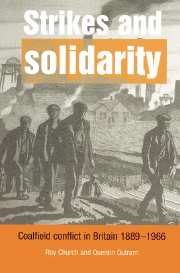Book contents
- Frontmatter
- Contents
- List of figures and tables
- Preface
- List of abbreviations
- 1 Interpreting coalfield conflict: focus and formulations
- 2 Tradition and modernity: the mining industry 1889–1940
- 3 Employers and workers: organizations and strategies
- 4 Employers and workers: ideologies, attitudes and political orientations
- 5 Configurations of strike activity
- 6 Strike participation and solidarity before 1912
- 7 Strikes, organization and consciousness in 1912 and after
- 8 Conflictual context? The ‘isolated mass’ revisited
- 9 Mining and modernity: size, sectionalism and solidarity
- 10 The foundations of strike propensity
- 11 Miners and management: agency and action
- 12 Industrial relations and strikes after nationalization
- 13 International perspectives
- 14 Myths and realities: strikes, solidarity and ‘militant miners’
- General appendix
- List of references
- Index
13 - International perspectives
Published online by Cambridge University Press: 04 December 2009
- Frontmatter
- Contents
- List of figures and tables
- Preface
- List of abbreviations
- 1 Interpreting coalfield conflict: focus and formulations
- 2 Tradition and modernity: the mining industry 1889–1940
- 3 Employers and workers: organizations and strategies
- 4 Employers and workers: ideologies, attitudes and political orientations
- 5 Configurations of strike activity
- 6 Strike participation and solidarity before 1912
- 7 Strikes, organization and consciousness in 1912 and after
- 8 Conflictual context? The ‘isolated mass’ revisited
- 9 Mining and modernity: size, sectionalism and solidarity
- 10 The foundations of strike propensity
- 11 Miners and management: agency and action
- 12 Industrial relations and strikes after nationalization
- 13 International perspectives
- 14 Myths and realities: strikes, solidarity and ‘militant miners’
- General appendix
- List of references
- Index
Summary
International patterns and analyses
A detailed comparison between the history of strikes in the British coalmining industry with that in the other principal coal producing countries lies far beyond the scope of our research. The focus on ordinary, local, inter-colliery strike differences which we have adopted has no parallel in research carried out on the industry in other countries, ruling out the presentation of a comparative, systematic coda with which to end our study. Indeed, since the publication of two seminal articles in the 1950s, by Kerr and Siegel (1954) and by Rimlinger (1959), who responded to their observations on international strike propensities, the subject of coalminers' strike pronencss has been either marginal to historians' research on strikes, focused particularly on strike waves, whether on a national or international basis, or limited to a relatively brief period, especially before the First World War. These studies have produced valuable contributions to the history of strikes on an international level. However, the objectives of this research, ambitious though they have been, differ from our own, in part because several of the authors were interested primarily in the political dimensions and significance of strikes in general, rather than explaining the character and causes of strikes in coalmining or any other particular industry (see Shorter and Tilly 1974; Stearns 1975; Geary 1981; Cronin 1982, 1985; Boll 1985; Michel 1987, 1992).
The view against which Rimlinger reacted was Kerr and Siegel's conclusion that occupational, rather than national socio-economic, characteristics were the main explanations for the behaviour patterns of groups of workers in different countries (Kerr and Siegel 1954:189–212).
- Type
- Chapter
- Information
- Strikes and SolidarityCoalfield Conflict in Britain, 1889–1966, pp. 240 - 259Publisher: Cambridge University PressPrint publication year: 1998



